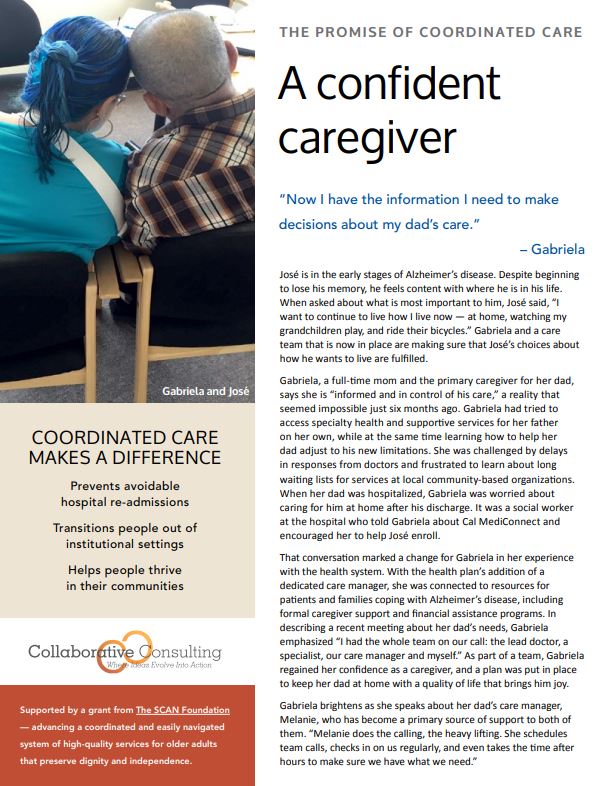The Promise of Coordinated Care: Gabriela’s Story
summary
Coordinated Care Makes a Difference. It prevents avoidable hospital re-admissions, transitions people out of institutional settings and helps people thrive in their communities. Read Gabriela’s case study.
Date Updated: 01/14/2016The Promise of Coordinated Care
A Confident Caregiver
José is in the early stages of Alzheimer’s disease. Despite beginning to lose his memory, he feels content with where he is in his life. When asked about what is most important to him, José said, “I
want to continue to live how I live now — at home, watching my grandchildren play, and ride their bicycles.” Gabriela and a care team that is now in place are making sure that José’s choices about
how he wants to live are fulfilled.
“Now I have the information I need to make decisions about my dad’s care.” – Gabriela
Gabriela, a full-time mom and the primary caregiver for her dad, says she is “informed and in control of his care,” a reality that seemed impossible just six months ago. Gabriela had tried to access specialty health and supportive services for her father on her own, while at the same time learning how to help her dad adjust to his new limitations. She was challenged by delays in responses from doctors and frustrated to learn about long waiting lists for services at local community-based organizations. When her dad was hospitalized, Gabriela was worried about caring for him at home after his discharge. It was a social worker at the hospital who told Gabriela about Cal MediConnect and encouraged her to help José enroll.
That conversation marked a change for Gabriela in her experience with the health system. With the health plan’s addition of a dedicated care manager, she was connected to resources for
patients and families coping with Alzheimer’s disease, including formal caregiver support and financial assistance programs. In describing a recent meeting about her dad’s needs, Gabriela
emphasized “I had the whole team on our call: the lead doctor, a specialist, our care manager and myself.” As part of a team, Gabriela regained her confidence as a caregiver, and a plan was put in place to keep her dad at home with a quality of life that brings him joy.
Gabriela brightens as she speaks about her dad’s care manager, Melanie, who has become a primary source of support to both of them. “Melanie does the calling, the heavy lifting. She schedules
team calls, checks in on us regularly, and even takes the time after hours to make sure we have what we need.”
Download the publication for all visuals and complete references.
Continue Reading
This policy brief provides an introduction to The SCAN Foundation’s CLASS Technical Assistance Brief Series, which explores many of the critical issues to be considered for successfully implementing CLASS.
This policy brief describes the broad needs of individuals with disability and the wide range of supportive and environmental solutions that can allow for the most independent living possible. It suggests how findings on social and environmental supports for individuals with disability can inform implementation of CLASS.
This policy brief provides background on the historical development of benefit eligibility triggers in the private long-term care insurance market. Understanding how these triggers came into being can provide important information to those charged with implementing the CLASS Plan.


